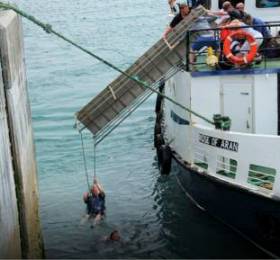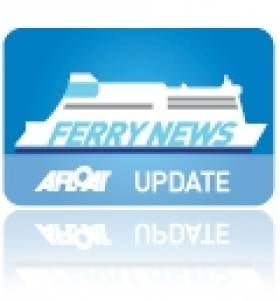Displaying items by tag: Rose of Aran
#MCIB - Lack of safety management contributed to an incident in which two people fell into the water while disembarking from a ferry at Inis Oírr Pier last summer.
That’s according to the Marine Casualty Investigation Board (MCIB) report on the event that involved the passenger ferry Rose of Aran on 6 June 2016.
Two passengers disembarking the ferry that morning, a man and a woman, were treated for shock after entering the water when the gangway slipped off the quayside.
It emerged that the stern line holding the Rose of Aran at its berth, fastened by a bystander and not checked by crew at the bow lines, had come loose at some point after passengers began disembarking.
The stern line is not immediately visible from the boat’s wheelhouse — a situation made worse by crowds on the pier at the time blocking the already obscured view.
Upon noticing that the boat was drifting, the master attempted to move it back into position, but it was pushed away by wash from the engines of the boat moored astern, causing the gangway to slip.
In its analysis, the MCIB determined that the Liscannor Ferry Company, which operates the Rose of Arran, operated with a safety management system, or SMS, that “lacked specific risk assessments and standard operating procedures for berthing at the various piers and harbours used” by its vessels.
The SMS also lacked a ‘Man Overboard’ situation among its emergency drills. As a result, the crew “were not trained or prepared for recovery procedures within the confines of the harbour.
“The recovery of the casualties would not have occurred without people on the shore entering the water and assisting them to shore,” it added.
But the MCIB also took Galway County Council to task for the lack of bye-laws, or a harbour master, to govern operations at Inis Oírr Pier, which allows vessels to berth with engines running and regularly experiences overcrowding that “hinders the safe berthing of ferries”.
The full MCIB report can be downloaded below.
Ferry Runs Aground off Doolin for Three Hours
According to ferry operator Kevin O'Brien, there were no passengers on board at the time and the vessel got under way again when it was lifted from the rocks with the tide. Mr O'Brien added "this was a very minor incident and there was no damage to the ferry. Doolin is tidal so these things do happen. Even a few inches of water can make a difference".
The Irish Coast Guard was notified of the incident at midday, and its marine rescue co-ordination centre in Dublin requested that members of the local Coast Guard unit board the vessel to assess if there was a pollution risk.
Doolin Coast Guard personnel carried out an inspection and confirmed the ferry had not been damaged and there was no risk of pollution. At about 2.15pm the ferry got under way again with the tide. The company was able to operate services to and from the Aran Islands with its second vessel.





























































